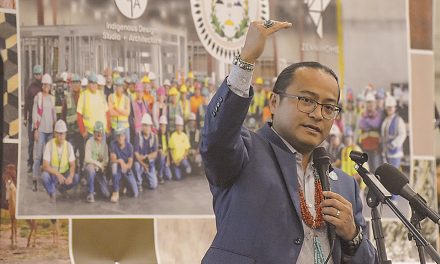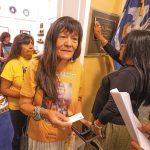
Council debates budget amid law enforcement, public service concerns
WINDOW ROCK
The 25th Navajo Nation Council held a special session Feb. 27 to finalize the fiscal 2025 budget, which led to a debate over funding allocations, law enforcement vacancies, executive protection services, and public resources.
Council Delegate Shaandiin Parrish, the Budget and Finance Committee chair, who sponsored the bill, began the discussions, saying the bill reconciled Continuing Resolution CS-39-24, ensuring government services continue through March 31.
A major discussion focused on funding for the Executive Protection Services after a prior decision had defunded it, reallocating $737,015 to district police offices. Council Delegate Germaine Simonson supported the amendment, arguing that defunding the EPS would negatively impact security personnel responsible for protecting Navajo leadership.
Delegate Carl Slater opposed the change, questioning the need for EPS funding without clearer details on its operations, while his colleague, Delegate Andy Nez, raised concerns, pointing out unfilled positions in the president’s office and calling for a focus on community law enforcement instead.
Avoiding shutdown
To avoid a looming tribal government shutdown, the Council approved the $529.9 million comprehensive budget for fiscal 2025, but not before implementing key amendments that reshaped funding allocations for law enforcement, veterans services, and public health initiatives. The session saw intense deliberations as the delegates debated financial priorities, ultimately making significant adjustments to the original proposal before finalizing the budget.
The budget, which required a two-thirds majority vote for approval, allocates funding across multiple branches of the Navajo government, with the Executive Branch receiving the largest share at approximately $452.8 million. The Legislative Branch is set to receive $21.6 million, while the Judicial Branch will operate with a budget of $18.8 million. Additionally, $36.5 million has been designated to cover fixed costs, and a portion of unspent funds from the previous fiscal year – totaling $15.4 million – has been allocated to address unmet needs.
Defunding EPS program
One of the most significant changes made during the session was the complete defunding of the Executive Protection Services program, which had been budgeted at $737,015. Instead, those funds were reallocated to various Navajo Police districts, including Chinle, Crownpoint, Kayenta, Shiprock, Tuba City, and Dilkon, each receiving approximately $123,169. The move was driven by concerns over public safety and the need for additional law enforcement resources in tribal districts.
The budget includes $60 million in statutory set-asides, ensuring long-term financial stability and strategic investments. Of this amount, $29.1 million – 12% of projected revenue – will be deposited into the Permanent Fund, which serves as a financial safeguard for the Nation’s future. Another $4.8 million, or 2% of projected revenue, has been allocated to the Land Acquisition Trust Fund to support land purchases that benefit the Navajo people. The Veterans Trust Fund will receive $9.6 million while $12.4 million has been earmarked for the Diné Higher Education Grant Fund, providing scholarships and financial assistance for Navajo students pursuing post-secondary education.
Infrastructure projects, funding sources
Additionally, $2 million has been designated for the Capital Outlay Match Fund, which supports infrastructure projects, and another $2 million has been set aside for the Water Rights Claims Fund to ensure the Nation’s legal and environmental interests in water resources.
Within the operating budget, the Executive Branch dominates the appropriations. The breakdown includes $131.2 million from the General Fund, $13.4 million from Indirect Cost Recovery, and $12.4 million from the Diné Higher Education Grant Fund. Additional funding sources include $5.4 million for External Funds Cash Match, $13.1 million from the Unreserved, Undesignated Fund Balance (a fund used by the Navajo Nation to address budget shortfalls and other needs), and major contributions from the Proprietary Fund at $109.1 million and the Fiduciary Fund at $117.3 million. Another $50.7 million has been allocated from the Special Revenue Fund, which is made up of internally generated funds.
The Legislative Branch’s total budget of $21.6 million includes $18 million from the General Fund, $2 million from the Indirect Cost Fund, and $1.5 million from the UUFB. The Judicial Branch has been allocated $18 million from the General Fund, $133,627 from Indirect Costs, and an additional $669,183 from the UUFB. These funds will ensure the continued operation of Navajo courts and judicial services.
Fixed costs, totaling $36.5 million, will cover essential government expenses, including administrative operations, infrastructure maintenance, and utility costs. Of this amount, $30.1 million is allocated from the General Fund, while $6.3 million will be sourced from Indirect Cost Recovery.
Addressing unmet needs, oversight and accountability
A key financial component of the fiscal 2025 budget is the allocation of $15.4 million from the UUFB to address unmet needs. The UUFB comprises unspent funds from previous fiscal years, and this year’s allocation was influenced by a reported $36.5 million in personnel lapse funds from 2024. These funds will be directed toward critical shortfalls in government operations.
In addition to budget reallocations, the Council also introduced amendments focusing on oversight and accountability within the Executive Branch.
The Navajo Division of Transportation was directed to submit a written report to the Resources and Development Committee by the third quarter of fiscal 2025, detailing an update on the memorandum of understanding for Navajo Route 474, which stretches for about 12 miles along U.S. Highway 550. The report is expected to outline maintenance and snow removal plans for the road, which serves communities in Counselor, Ojo Encino, Torreon, and Pueblo Pintado.
This suggests that concerns have been raised about the adequacy of road maintenance, particularly in dealing with seasonal challenges such as snowfall. The requirement for a formal report ensures that the committee receives clear documentation on whether the MOU is effectively addressing the needs of the community. If the report finds that maintenance efforts are insufficient, further action may be taken to secure additional funding or reassess contractual agreements.
Another legislative amendment requires the Department of Personnel Management, the president’s office, and the Division of Public Safety to submit both written and oral reports to the Law and Order Committee by the end of the third quarter regarding the defunding of the EPS program. The reports must assess the impacts of the funding cut and propose alternative solutions if needed. A final report on the matter must be submitted to the Naabik’íyáti Committee by the fourth quarter of the fiscal year.
The request for a detailed plan suggests that lawmakers want a clearer understanding of whether the EPS should continue in its current form or be further restructured. If the report reveals inefficiencies, further reductions or reassignments of duties may follow.
Comprehensive plan, employee compensation
The Council also took steps to enhance public health data collection. The Navajo Epidemiology Center, under the Department of Health, has been tasked with presenting a comprehensive plan to the Health, Education, and Human Services Committee by the end of the third quarter. This plan will establish the center as the primary hub for data collection on social issues affecting the Navajo Nation, including suicide, violence, substance use, and missing persons. The report must also include recommendations for increasing funding and staffing to ensure the center’s ability to effectively manage and analyze data. Additionally, the center is required to share its findings with the Diné Action Plan task groups, which focus on suicide prevention, substance use, domestic violence, and missing and murdered Indigenous relatives.
Further budget amendments redirected funding to support veterans and educational initiatives. The president’s office saw a reduction of $150,000 from various programs including non-capital expenditures, consulting, media, and program funds. These funds were reallocated to the Navajo Nation Veterans Administration, which will now receive additional funding for supplies, lease and rental costs, and facility repairs.
The amendment suggests that previous funding levels were deemed insufficient to meet the needs of veterans, leading to a reallocation from executive administration to direct service provision.
To address concerns about employee compensation, a new budget line was created, which will fund excess annual leave forfeiture payouts. Employees who lost leave over 320 hours at the end of 2024 will now be compensated, ensuring fair treatment of government workers who were unable to use their accrued time off.
After a lengthy discussion, the Council approved the amendment, keeping the EPS program while continuing to address broader law enforcement concerns.
Unfilled positions, mental health strain and EPS officers
During the debate, the high number of unfilled positions within the Navajo Police Department became a central issue, which Delegate Danny Simpson criticized, stating the proposed budget funded only six executive protection positions, which are held by certified Navajo Nation Police officers, arguing that the priority should be filling the 216 vacancies that already exist within the Navajo Nation Division of Public Safety.
Delegate Vince James, the HEHSC chair, supported increased funding for medical examiners and law enforcement wages. He also raised concerns about the lack of psychologists in the department, emphasizing the mental strain on officers.
“We still have 216 unfilled positions in public safety, and that’s a concern. Our officers and first responders are working under strained conditions, some taking on additional responsibilities just to keep up with the demand. We need to continue pushing to fill these positions so that our communities feel secure,” James said.
A separate issue arose regarding the reclassification of EPS officers from “executive protection agent” to “police officer” in May 2024. The change raised concerns about whether these officers had the legal authority to serve as bodyguards, given past Department of Justice rulings that barred Public Law 93-638 contract police officers from acting in such roles.
Reycita Toddy, the DPM interim executive director, said the reclassification first occurred in January 2024 before being reversed. Patrick Sandoval, the president’s chief of staff, defended the EPS program, citing past threats to Navajo leadership and stressing the need for proper security.
Original budget was designed for various sectors
The original Navajo Nation Fiscal Year 2025 Comprehensive Budget Bill was designed to allocate funding across various governmental sectors, ensuring that key services such as law enforcement, health, infrastructure, and education received financial support. The new amendments introduce significant changes to the original bill, affecting how funds are distributed and increasing oversight in key areas.
One of the most critical amendments rescinds part of the original budget bill, which was previously approved on Feb. 24. While the specific portion being rescinded is not explicitly stated, this change implies a shift in financial priorities. It suggests that previously allocated funds may have been reassessed because of emerging needs or inefficiencies in the original budget structure. The rescission signals that the Council has recognized a need for reallocation to ensure that funds are directed toward more pressing concerns.
A significant reallocation of funds affects the EPS. Under the original budget, the EPS was likely allocated funding to provide security for high-ranking officials within the Navajo Nation government.
This move indicates a strategic redirection of financial resources to strengthen community policing rather than prioritizing executive security. By funding multiple police districts instead of a specialized security unit, the amendment suggests a focus on improving public safety at the local level. The redistribution of these funds means that district police units will now have additional financial resources for operational costs, personnel, equipment, or emergency response initiatives.
The amendments also impose new reporting requirements for various agencies, increasing accountability and oversight.
Enhancing services
A similar reallocation occurs within the Department of Health, where funds are being redirected to the Navajo Nation Library. The library will now receive $70,000 in funding for operational and other needs. This amendment recognizes the importance of educational resources, literacy programs, and community access to learning materials. The funding may be used to enhance library services, improve technology access, expand book collections, or support staffing needs. The decision to shift funds from the health department to the library suggests that while public health remains a priority, education, and community learning initiatives require immediate financial support.
To ensure that all amendments are accurately reflected in budgetary documentation, the Office of Management and Budget is directed to prepare a revised comprehensive budget. This ensures that financial records align with the newly approved allocations. Additionally, the amendment includes provisions to renumber and supersede any inconsistent language in other amendments. This procedural step prevents conflicts between previous budget adjustments and ensures that the most recent changes take precedence.
The amendments represent a significant restructuring of financial priorities within the Navajo Nation’s fiscal 2025 budget. By shifting resources from the EPS to community policing, introducing stricter reporting requirements, reallocating funds toward veterans services and education, and centralizing health data collection, the changes emphasize a focus on public safety, transparency, and long-term planning.
The rescission – part of the original budget – suggests that financial decisions are being continuously reassessed to align with evolving needs. While these amendments may address pressing concerns, their effectiveness will depend on how well the newly allocated funds are used and whether the mandated reports lead to further policy improvements.
Library secures $70,000
Beyond law enforcement, the Council debated reallocations affecting public services. Nez proposed shifting funds from travel and discretionary expenses to the Navajo Nation Library.
Delegate Charles-Newton supported the proposal, emphasizing the library’s role in providing legal codes, educational materials, and cultural preservation resources.
“You’re taking away travel expenses and furniture, and we’re putting it into the Navajo Nation Library, a place where many of our Navajo people go to get the resources they need,” she said.
Slater opposed the move, suggesting that funds should come from the UUFB, instead.
Tensions rise, budget management
Tensions rose when Simonson, Simpson and Shawna Claw, cited concerns about safety and decorum in the chamber when Simonson’s photo was posted to social media, which depicted her wearing a Nygren T-shirt. Speaker Crystalyne Curley called for a 30-minute recess before the session resumed.
Despite these disputes, the Council approved the fiscal 2025 budget, which ensures continued funding for law enforcement, executive security, and public services.
The budget includes $2 million for youth scholarships. It also provides funding for excessive leave payouts, addressing workforce challenges by compensating employees with over 300 hours of unused leave.
James stressed the importance of effective budget management, as most funds must be spent within five months.
“We need to make sure that the departments are spending wisely and effectively. If we don’t utilize the funds properly, we could see issues down the road with future allocations,” he said.
While the budget secures public safety funding, James and other delegates emphasized the urgent need to fill vacancies to relieve the strain on existing officers and emergency responders.
Awaiting president’s approval
The budget now awaits Nygren’s approval. Although Nygren has the option to veto or modify specific allocations, James believes major changes are unlikely.
“At this point in the fiscal year, it would be unlikely to see major changes. The focus should be on execution and ensuring these funds reach the people who need them most,” he said.
Looking beyond the immediate budget, the Council is monitoring federal funding policies, as potential cuts could impact tribal programs. James emphasized the need to protect treaty obligations and prepare for legal action if necessary.
“There is always the risk of federal budget cuts, and we have to be prepared for that. If necessary, we’re ready to pursue legal action to protect our funding and our treaty rights. We are the largest tribe in the country, and our treaty obligations must be honored,” he said.
With the budget in place, the Council members will oversee spending and adjust as needed. James emphasized that the work continues beyond budget approval, ensuring that resources serve the Navajo people effectively.
As the budget moves to Nygren’s desk, it awaits the final decision that will determine how these financial measures are implemented and how resources will be distributed to the communities that rely on them.








 Highway 264,
Highway 264, I-40, WB @ Winslow
I-40, WB @ Winslow